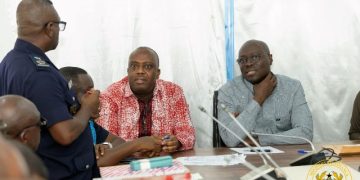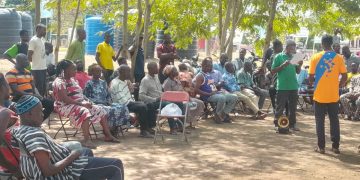Tensions rose sharply during a meeting convened to discuss new government proposals addressing illegal mining, as the University of Ghana chapter of the University Teachers Association of Ghana (UG-UTAG) clashed with Organized Labor leadership.
The UG-UTAG President, Dr. Ransford Gyampo, released a statement detailing the contentious nature of the meeting, alleging that labor leaders sought to undermine the fight against illegal mining.
According to Prof. Gyampo, two prominent leaders, Joshua Ansah and Dr. Bampoe, arrived at the meeting with a prepared speech calling for the suspension of an impending strike.
The meeting had been arranged to address UG-UTAG’s demand for urgent action on illegal mining, commonly known as galamsey, which is wreaking environmental havoc across the country.
Prof. Gyampo and his colleagues raised concerns over the pre-prepared nature of the speech, questioning the appropriateness of such a move before hearing all sides of the discussion.
After some back-and-forth, the two leaders issued an apology, but tensions remained high.
They then presented what was described as “new interventions” from the government, ostensibly aimed at addressing the crisis.
However, UTAG members swiftly rejected the proposals, stating that they were no different in substance from earlier suggestions which had already been dismissed.
Prof. Gyampo’s statement emphasized that UG-UTAG had, in their earlier meetings, called for at least a temporary moratorium on mining activities to allow for a more comprehensive national discussion on the issue. This proposal was again put forward, but it was met with resistance.
As the meeting escalated, UG-UTAG accused the leadership of Organized Labor of disregarding their suggestions and pushing through a pre-determined agenda.
Before additional input could be given, the leadership reportedly called in the media and delivered their prepared speech publicly, much to the frustration of the UTAG members present.
He described the meeting as “rancorous and acrimonious,” and noted that it ended in disunity.
In his statement, Dr. Gyampo expressed disappointment with the lack of collaboration, particularly given the critical importance of the fight against illegal mining, which he described as an “existential threat.”
He also hinted at a possible fracture between UG-UTAG and other labor unions, stating that the UG-UTAG National Executive Committee (NEC) would meet later in the evening to decide on their next steps.
He further called on members of the association to brace themselves to act as the “conscience of the nation,” suggesting that UG-UTAG might end up being the sole advocate pushing for stringent measures against illegal mining if other unions fail to take a strong stance.
Background on the Illegal Mining Crisis
Illegal mining, also known as galamsey, has been a growing problem in Ghana for years.
The activity is largely driven by small-scale miners operating without the necessary licenses, often in ecologically sensitive areas like riverbeds and forest reserves. This has resulted in widespread deforestation, water pollution, and destruction of arable land.
Several attempts have been made by the government to curb the practice, including the establishment of the Inter-Ministerial Committee on Illegal Mining in 2017, which led to the temporary ban of small-scale mining activities.
Despite these efforts, galamsey has continued unabated in many parts of the country, with critics accusing the government of not doing enough to tackle the issue at its root.
Environmentalists, academics, and civil society organizations have been vocal in their opposition to galamsey, highlighting its long-term impacts on public health and food security.
UG-UTAG has been one of the most prominent groups advocating for stronger action, urging the government to implement immediate and effective measures to halt the destruction caused by illegal mining.
However, the relationship between labor unions and the government has become strained in recent months, particularly around how best to address the economic and environmental fallout of galamsey.
The government’s failure to meet union demands for a more aggressive approach has led to increased frustration and the threat of strikes.
UTAG’s Role in the Fight Against Galamsey
The University Teachers Association of Ghana (UTAG) has emerged as a critical voice in the fight against illegal mining, particularly through its academic research highlighting the socio-economic and environmental impacts of the activity.
UTAG has called for more comprehensive policies that not only tackle illegal mining but also ensure sustainable livelihood alternatives for communities that depend on the mining sector.
UTAG’s position is that any failure to act decisively against galamsey would have dire consequences for future generations, given the scale of environmental degradation it has already caused. The association has also been instrumental in organizing forums and dialogues aimed at raising public awareness on the issue.
Next Steps
Following the acrimonious meeting, the UTAG NEC is expected to reconvene to deliberate on their course of action. Many anticipate that UG-UTAG will double down on its demands for a temporary moratorium on mining activities, with the possibility of further industrial action if their concerns continue to be ignored.
The UG-UTAG President’s strong remarks suggest that the association is prepared to stand alone in its fight if necessary. The coming days will be crucial in determining whether UG-UTAG can rally other unions to its cause or if the rift between labor leaders will deepen.
As the issue of illegal mining remains one of the most pressing environmental crises in Ghana, the outcome of these discussions will have far-reaching implications for both the labor movement and the country’s efforts to protect its natural resources.
Source: www.kumasimail.com /IJB/Kumasi

































































